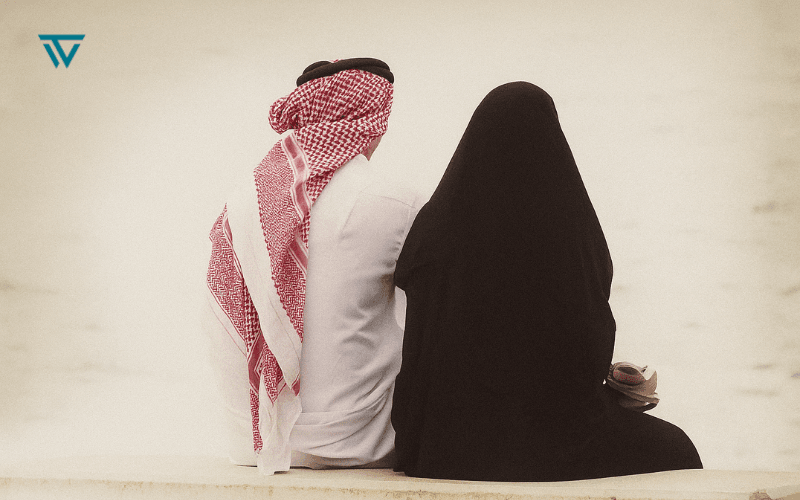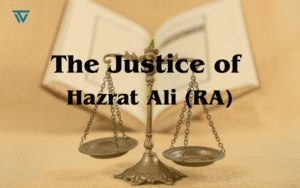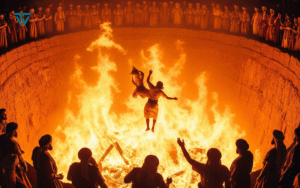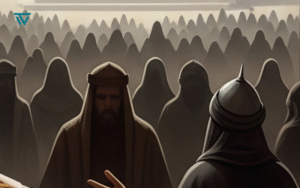Islamic Love Story That Redefines Muslim Couple Goals

There’s a saying, “Love at first sight.” In simple terms, it means falling in love at the first glance without a second thought. That’s exactly what happened to the boy. He fell for her instantly. Of course, there was a good reason for his crush. When the girl with waist-length, wavy hair walked by, it was incredibly hard to look away. The boy suddenly realized that whenever she was near, he would get extremely nervous, his heart would start beating rapidly, and his knees would even tremble from the anxiety.
The boy came to believe he couldn’t live without this girl. He had to have her, no matter what. With great difficulty, he managed to get her phone number. He tried to win a small place in her heart, but the girl wouldn’t agree. Some time passed—one month, two months, three months. Eventually, the nature of human character compelled them to lean towards each other. The boy, who was once utterly indifferent to life, suddenly found a new inspiration. He felt an incredible sense of peace just hearing her sweet voice on the other end of the line. Even after talking all night, he would wonder why the night ended so quickly.
The Clash of Infatuation and Reality
Again, some time flew by quickly: one, two, three years. Then, the boy suddenly discovered that the attraction had somehow faded. Seeing her no longer made his heart beat fast, and that sense of peace in his heart had vanished. The girl also realized that things weren’t the same. Disagreements began, and eventually, everything ended. A few very sad days went by. And then? Then, the boy started to find someone new appealing. And then again…
I’ve just tried to tell a common story of about 90 percent of the pre-marital relationships we see around us. Most of the time, these relationships don’t make it to marriage. And even if they do, when boundless responsibilities pile on top of emotions, the feelings start to fade. Couples who claim to “completely understand each other” discover a whole new person after marriage. This is perhaps why the divorce rate in “love marriages” is abnormally high. Because these marriages are not for the pleasure of Allah, they lack His blessings. The fantasy of being together from the first love until death, as depicted in contemporary literature, is limited to novels and the silver screen. Reality tells a completely different story. In these “stories of coming closer,” the chances of drifting apart are much higher. That’s why today, I will tell a completely different story of coming closer, a timeless Islamic love story.
An Islamic Love Story: The Beginning for Al-Amin and Khadijah (RA)
The hero of our story is Muhammad ibn Abdullah (peace be upon him). A calm and steady young man, he was raised in his uncle’s house. He preferred to stay away from the corruption of society, finding solace in solitude. Due to his profound honesty and truthfulness, everyone called him Al-Amin (the Trustworthy). It was likely for this reason that he caught the eye of one of the wealthiest merchants of that time, Khadijah (may Allah be pleased with her). She sent a proposal to Muhammad (PBUH) to conduct business on her behalf:
“I am in great need of an honest and truthful person. Your reputation as Al-Amin has drawn me to you. If you can uphold this trust and take responsibility for my trade and business, I will gladly agree to give you double the share of the profits. If this proposal is agreeable to you, I welcome you.”
Muhammad (PBUH) accepted this offer. He set off for Syria with Khadijah’s (RA) servant, Maysarah, and her merchandise.
A Wondrous Sign of a Future Prophet
Upon reaching Syria, he rested under a tree near a church. A priest came out of the church and asked Maysarah, “Who is the man resting under the tree?” Maysarah replied, “He is an inhabitant of the Haram (Makkah).” The priest said, “No one but a prophet has ever rested under this tree.”
Upon returning from Syria, Maysarah informed Khadijah (RA) of what the priest had said. This incident left a deep impression on her mind. She told her cousin, Waraqah ibn Nawfal, who was a learned scholar of the Torah and the Gospel at the time, what the priest had said. After hearing everything, Waraqah said, “If these events are true, then Muhammad is indeed the prophet of this ummah (community). And I know very well that the time of the one we are waiting for is very near.”
Waraqah’s words deeply moved Khadijah (RA). Meanwhile, Muhammad (PBUH) had also returned from the business trip with a record amount of profit. His honesty fascinated her, and she felt an interest in marrying him. Some pseudo-intellectual writers try to prove that the Prophet (PBUH) married Khadijah (RA) for her wealth. These ignorant (or are they dishonest?) people will never mention that it was Khadijah (RA) herself who gave the business and marriage proposals to the Prophet (PBUH). After consulting with his uncle, Abu Talib, Muhammad (PBUH) agreed to the marriage. At the time, he was 25 and Khadijah (RA) was 40. Abu Talib delivered the sermon at their wedding.
Khadijah’s (RA) Support During the Difficult Time of Prophethood
After the wedding, did Khadijah’s (RA) infatuation begin to fade? No, the story did not proceed like our modern-day tales. Instead, her admiration grew manifold. Muhammad (PBUH) did not misuse any of Khadijah’s (RA) wealth and continued to live a simple life as before. We can easily understand Khadijah’s (RA) perspective on Muhammad (PBUH) after their marriage from the events of the first revelation. When Muhammad (PBUH) received the first revelation and returned home trembling, fearing for his life, Khadijah (RA) covered him and said with confidence:
“Impossible! Allah will never disgrace you. You uphold the rights of kinship, help the distressed, show hospitality to guests, and support others in times of affliction on the path of truth.” Her unwavering support in his most vulnerable moment sets a standard for Muslim couple goals.
The Prophet (PBUH) and Khadijah (RA) were such perfect complements to each other that he did not take a second wife during her lifetime. Their bond is a timeless example of what Muslim couple goals truly represent. All of the Prophet’s children, except for Ibrahim, were born to Khadijah (RA). Her death caused the Prophet (PBUH) so much grief that the year she passed away has been named the “Year of Sorrow” by biographers.
A Love That Never Faded: The Ultimate Muslim Couple Goals
The Prophet’s (PBUH) love was not fragile like ours, so it did not end with her death. Later, for the sake of the faith and by divine indication, he entered into several other marriages, but Khadijah (RA) always remained vivid in his memory.
After Khadijah’s (RA) death, her sister, Halah (RA), once came to visit the Prophet (PBUH) and asked for permission to enter. Her voice was very similar to Khadijah’s (RA). As soon as he heard it, the Prophet (PBUH) was reminded of Khadijah (RA). He said, “It must be Halah.” Aisha (RA) was present and felt a pang of jealousy. She said, “You still remember that old woman and praise her so, even though Allah has given you better in her place.” Hearing this, the Prophet (PBUH) became very angry and said, “By Allah! Allah has not given me better than her. She believed in me when people denied me. She affirmed my truthfulness when everyone called me a liar.”
Whenever the Prophet (PBUH) slaughtered a goat, he would send its meat as a gift to Khadijah’s (RA) friends in loving memory of her.
Among the captives from the Battle of Badr was the Prophet’s (PBUH) son-in-law, Abu al-As, the husband of his daughter Zaynab. When the Muslims were arranging to send ransom for the captives’ release, Zaynab sent her own necklace for her husband’s freedom. This was the necklace Khadijah (RA) had taken from her own neck and given to Zaynab at her wedding. Seeing the necklace, the Prophet (PBUH) couldn’t control himself. His eyes filled with tears. He said to his companions, “If you agree, then return this necklace and release the prisoner without ransom.”
The Ultimate Islamic Love Story: A True Example of Love
A primary reason for marriage in our time is temporary infatuation and unrestrained lust. In the marriage of a 40-year-old woman to a 25-year-old man, there was none of that. There was love for the sake of Allah and mutual, everlasting admiration. Thus, the love of Tahira (The Pure One) and Al-Amin (The Trustworthy) did not end with one’s death.
The love of our current generation ends at “Ana Uhibbuki” (I love you); the phrase “Fillah” (for the sake of Allah) is missing. May Allah the Almighty keep us away from such dazzling but hollow forms of love. In my teenage years, I used to think that the lives of religious scholars were loveless and devoid of romance. But now, I firmly believe that the world’s greatest and purest love stories, like this Islamic love story, were written by them. Our generation is dazzled by dim light only to be blinded by a brighter one. This is perhaps why the generation that laments for Romeo and Juliet knows nothing about Khadijah (RA) and Muhammad (PBUH).
May Allah the Almighty connect us to that pure love, the kind found in a true Islamic love story, a love filled with admiration for honesty, a love that offers words of hope in times of trouble, a love whose voice can stir emotions even after death. The kind of love that makes a wife sprinkle water on her husband’s face late at night to wake him for Tahajjud (late-night prayer) together, and on a beautiful, starry night, a voice, moist with deep affection, says, “Ana uhibbuki Fillah.”









